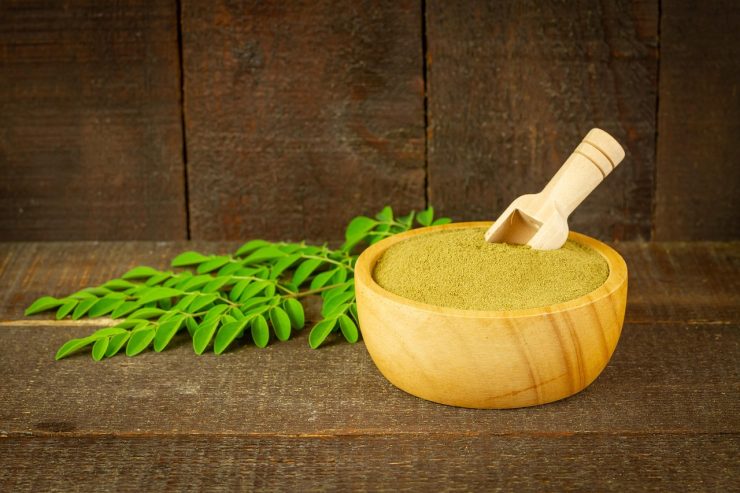Moringa oleifera—sometimes called the drumstick tree, horseradish tree, or ben oil tree—is a plant known for its impressive nutritional and medicinal qualities. Used for thousands of years in India and Africa, moringa is considered a true superfood. The tree is incredibly resilient, thriving in a range of soils, including dry, nutrient-depleted ground, and it grows well even in drought conditions. This adaptability makes it a vital food source in regions with harsh climates.
Nearly every part of the moringa tree—leaves, seeds, pods, bark, and roots—has been used in traditional medicine to treat a wide range of ailments.
Nutritional Powerhouse
Moringa is packed with nutrients and bioactive plant compounds. It contains more than 90 protective substances, including isothiocyanates, flavonoids, and phenolic acids. The leaves are particularly rich in essential nutrients such as protein, vitamins A, B2, B6, and C, along with iron and magnesium. The pods, often consumed in India and Africa, are especially high in vitamin C.
Antioxidant Benefits
One of moringa’s standout features is its antioxidant content. These antioxidants help combat oxidative stress and reduce the damage caused by free radicals—compounds known to contribute to chronic illnesses such as cancer, heart disease, and diabetes.
Key antioxidants in moringa include:
-
Quercetin – Known for its anti-inflammatory and blood pressure-lowering effects.
-
Vitamin C – A strong immune booster that also supports collagen production for healthy skin.
-
Chlorogenic acid – Also found in coffee, it may help moderate blood sugar levels after meals.
Thanks to its potent antioxidant properties, moringa leaf powder has even been shown to work as a natural preservative for meat.
Blood Sugar Support
Several studies suggest moringa may help stabilize blood sugar levels. In one study, women who took 1.5 teaspoons of moringa powder daily for three months saw their fasting blood sugar drop by 13.5%. Another small study found that adding 50 grams of moringa leaves to a meal reduced the blood sugar rise by about 21% in participants with diabetes.
Natural Inflammation Fighter
Chronic inflammation is tied to a range of serious diseases, including Alzheimer’s, cancer, and cardiovascular conditions. Moringa contains isothiocyanates—plant compounds known for their strong anti-inflammatory effects—making it a natural option for inflammation support.
Arsenic Detox Support
In areas where rice and other foods are contaminated with arsenic, moringa may offer protection. Studies involving animals have shown that moringa leaves and seeds can help reduce arsenic buildup in the body, likely due to their antioxidant and fiber content.
Environmental Benefits
Beyond its nutritional value, moringa has a positive impact on the environment. It grows in poor soils, helps restore fertility, and supports reforestation and erosion prevention. The seeds can even be used to purify water by attracting and binding impurities—0.2 grams of ground moringa seed can purify a liter of contaminated water.
Safety and Side Effects
Moringa is generally well tolerated and considered safe when consumed in moderate amounts. However, consuming large quantities may lead to side effects such as:
-
Low blood pressure
-
Slowed heart rate
-
Uterine contractions (a concern during pregnancy)
-
Potential fertility interference
-
Possible cell changes when high amounts of seeds are consumed
Certain medications may also interact with moringa:
-
Thyroid medications – Moringa may enhance thyroid function, potentially intensifying the effects of medications like levothyroxine.
-
Liver-metabolized drugs – Moringa could slow liver metabolism of certain medications.
-
Diabetes drugs – Since both moringa and medications lower blood sugar, combining the two requires careful monitoring.
-
Blood pressure medications – Using both could lead to overly low blood pressure.
How to Use Moringa
Moringa is available in a variety of forms. Each offers its own benefits and applications:
-
Dried leaves or moringa powder – Often used in smoothies or sprinkled on meals; doses up to 6 grams per day have been shown to be safe for short-term use.
-
Moringa tea – Made from steeped dried leaves and popular as a calming herbal drink.
-
Moringa seeds – Sometimes eaten in their immature “drumstick” form, similar to green beans.
-
Moringa oil – Also known as Ben oil, it’s found in natural skincare products and can be used topically. It should be stored away from heat and light.
Moringa oleifera offers a wide range of nutritional and therapeutic benefits, making it one of the most versatile plants available. Whether used in meals, taken as a supplement, or applied topically, moringa continues to earn its reputation as a powerful addition to a health-conscious lifestyle.











